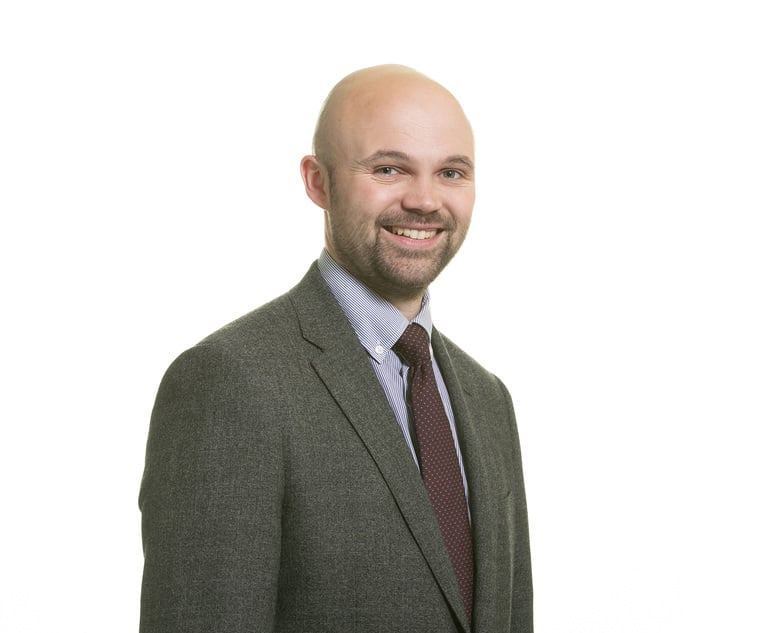Dickinson Wright's Former CEO Elevated to Chairman After 9-Year Growth Spurt
William Burgess will move into the chairman position after a nine-year run as CEO.
January 07, 2019 at 05:58 PM
4 minute read
 William Burgess, chairman of Dickinson Wright (Courtesy photo)
William Burgess, chairman of Dickinson Wright (Courtesy photo)
During his nine-year run as CEO of Michigan-based Am Law 200 firm Dickinson Wright, William Burgess oversaw a growth spurt that has seen its revenue more than double since 2010. In the past two years alone, Dickinson Wright has jumped 20 spots in the Am Law 200 to rank No. 131 last year.
But all good things must come to an end. Sort of.
Dickinson Wright has a three-term limit on the CEO role, but Burgess will stay in a leadership role: He has been elevated to chairman of the 440-lawyer firm that brought in $522,000 in profits per equity partner last year. The most recent chairman at Dickinson Wright was Jim Samborn, who served in the role from 2010 to 2017.
The firm announced in October that Michael Hammer, who had served as Burgess' deputy CEO, would be the firm's new CEO.
Burgess has spent his entire 35-year legal career at Dickinson Wright and has been in management roles for about 20 years, he said.
The growth experienced during Burgess' leadership of the firm came mostly during a turbulent post-recession period that has been marked by lagging growth in demand, increasing competition among firms and a growing requirement to invest in technology and other processes in order to service clients more efficiently.
“I do think that opportunity exists within any change driven by market forces or competitive forces,” Burgess said. “If you know what you are, don't pretend to be something else. And if you listen to needs of clients and their rightful demand for value and efficiency in assisting them with their legal and business problems, you can create real opportunity out of a challenging marketplace. And if I am proud about anything our management team has accomplished over the past nine years, I do think we've created that opportunity for our future, hand in hand with client involvement.”
Dickinson Wright's most recent group hire came in November, when it brought on a five-lawyer IP team that was formerly the bulk of boutique firm Mayback & Hoffman.
Last year, the firm launched in Silicon Valley with a six-lawyer intellectual property team brought over from California's Downey Brand. The firm also expanded a Toronto office in 2011 by bolting on 25-lawyer local firm Aylesworth; two years later, Dickinson Wright absorbed 60-lawyer Arizona firm Mariscal, Weeks, McIntyre & Friedlander. In 2015, Dickinson Wright brought on large groups of lawyers from a pair of dissolving firms: Las Vegas-based Gordon & Silver and Washington, D.C.-based IP boutique Roylance, Abrams, Berdo & Goodman.
In an October interview with The American Lawyer, Hammer, the incoming CEO, said the firm would continue to focus on hiring and growing the firm's footprint. He said the firm will also will invest in technology and seek to increase the hiring and promotion of women and minority lawyers and seek to provide a flexible work environment to attract young talent.
As for Burgess, the veteran law firm leader offered advice on what he found to be important qualities for managing attorneys.
“First of all, you have to be yourself. You have to have confidence that those who placed trust in you knew what they were doing based upon your track record as a professional and a person,” Burgess said. “It is critical that you be a good listener and really listen to things that are going on with your clients, prospective clients, the marketplace and competition. And those two things, in particular, are vital.”
Read More:
This Big Law Firm's Next Leader Knows How to Hire
Dickinson Wright Absorbs Boutique as IP Hiring Stays Hot
Dickinson Wright Opens Silicon Valley Office With 6 IP Hires
This content has been archived. It is available through our partners, LexisNexis® and Bloomberg Law.
To view this content, please continue to their sites.
Not a Lexis Subscriber?
Subscribe Now
Not a Bloomberg Law Subscriber?
Subscribe Now
NOT FOR REPRINT
© 2025 ALM Global, LLC, All Rights Reserved. Request academic re-use from www.copyright.com. All other uses, submit a request to [email protected]. For more information visit Asset & Logo Licensing.
You Might Like
View All
Government Attorneys Face Reassignment, Rescinded Job Offers in First Days of Trump Administration
4 minute read


Trending Stories
- 1New York-Based Skadden Team Joins White & Case Group in Mexico City for Citigroup Demerger
- 2No Two Wildfires Alike: Lawyers Take Different Legal Strategies in California
- 3Poop-Themed Dog Toy OK as Parody, but Still Tarnished Jack Daniel’s Brand, Court Says
- 4Meet the New President of NY's Association of Trial Court Jurists
- 5Lawyers' Phones Are Ringing: What Should Employers Do If ICE Raids Their Business?
Who Got The Work
J. Brugh Lower of Gibbons has entered an appearance for industrial equipment supplier Devco Corporation in a pending trademark infringement lawsuit. The suit, accusing the defendant of selling knock-off Graco products, was filed Dec. 18 in New Jersey District Court by Rivkin Radler on behalf of Graco Inc. and Graco Minnesota. The case, assigned to U.S. District Judge Zahid N. Quraishi, is 3:24-cv-11294, Graco Inc. et al v. Devco Corporation.
Who Got The Work
Rebecca Maller-Stein and Kent A. Yalowitz of Arnold & Porter Kaye Scholer have entered their appearances for Hanaco Venture Capital and its executives, Lior Prosor and David Frankel, in a pending securities lawsuit. The action, filed on Dec. 24 in New York Southern District Court by Zell, Aron & Co. on behalf of Goldeneye Advisors, accuses the defendants of negligently and fraudulently managing the plaintiff's $1 million investment. The case, assigned to U.S. District Judge Vernon S. Broderick, is 1:24-cv-09918, Goldeneye Advisors, LLC v. Hanaco Venture Capital, Ltd. et al.
Who Got The Work
Attorneys from A&O Shearman has stepped in as defense counsel for Toronto-Dominion Bank and other defendants in a pending securities class action. The suit, filed Dec. 11 in New York Southern District Court by Bleichmar Fonti & Auld, accuses the defendants of concealing the bank's 'pervasive' deficiencies in regards to its compliance with the Bank Secrecy Act and the quality of its anti-money laundering controls. The case, assigned to U.S. District Judge Arun Subramanian, is 1:24-cv-09445, Gonzalez v. The Toronto-Dominion Bank et al.
Who Got The Work
Crown Castle International, a Pennsylvania company providing shared communications infrastructure, has turned to Luke D. Wolf of Gordon Rees Scully Mansukhani to fend off a pending breach-of-contract lawsuit. The court action, filed Nov. 25 in Michigan Eastern District Court by Hooper Hathaway PC on behalf of The Town Residences LLC, accuses Crown Castle of failing to transfer approximately $30,000 in utility payments from T-Mobile in breach of a roof-top lease and assignment agreement. The case, assigned to U.S. District Judge Susan K. Declercq, is 2:24-cv-13131, The Town Residences LLC v. T-Mobile US, Inc. et al.
Who Got The Work
Wilfred P. Coronato and Daniel M. Schwartz of McCarter & English have stepped in as defense counsel to Electrolux Home Products Inc. in a pending product liability lawsuit. The court action, filed Nov. 26 in New York Eastern District Court by Poulos Lopiccolo PC and Nagel Rice LLP on behalf of David Stern, alleges that the defendant's refrigerators’ drawers and shelving repeatedly break and fall apart within months after purchase. The case, assigned to U.S. District Judge Joan M. Azrack, is 2:24-cv-08204, Stern v. Electrolux Home Products, Inc.
Featured Firms
Law Offices of Gary Martin Hays & Associates, P.C.
(470) 294-1674
Law Offices of Mark E. Salomone
(857) 444-6468
Smith & Hassler
(713) 739-1250










